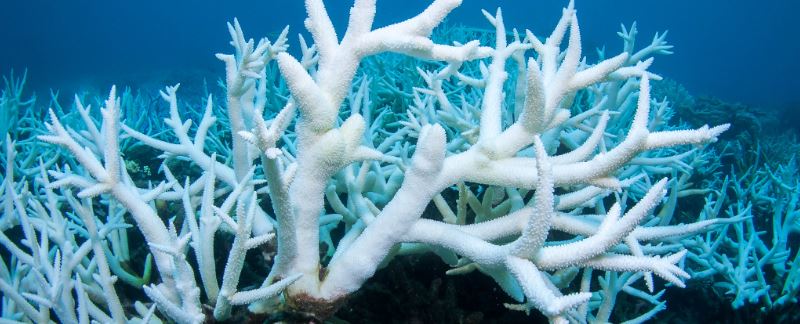


 1:28:27
1:28:27  2024-11-16
2024-11-16  926
926

Almost half of all warm-water species of coral are threatened with extinction – and climate change is the chief culprit, a new report said on Wednesday.
The update risk assessment from the International Union for Conservation of Nature (IUCN) was announced at the COP29 climate summit in Azerbaijan, which is being skipped by the leaders of many top polluting nations.
Oceans have absorbed around 90 percent of the excess heat in the atmosphere due to the release of carbon dioxide and other greenhouse gases.
Rising ocean temperatures have spurred mass bleaching events at coral reefs across the world, threatening crucial ecosystems for marine life as well as the livelihoods of people who rely on them.
The updated assessment of the IUCN's Red List of Threatened Species looked at reef-building corals, which live in warm, shallow waters in tropical areas.
Its analysis found that 892 reef-building coral species are now considered threatened, representing 44 percent of the total.
This marked a significant increase from the last assessment in 2008, when a third of all species was listed as threatened.
The organisation is still assessing the extinction risk for cold-water coral, which lives in deeper, darker ocean waters, making it difficult to study.
The IUCN called on negotiators at the COP29 conference to act quickly to reduce planet-heating fossil fuel emissions.
"Healthy ecosystems like coral reefs are essential for human livelihoods – providing food, stabilising coastlines, and storing carbon," IUCN chief Grethel Aguilar said in a statement.
"Climate change remains the leading threat to reef-building corals and is devastating the natural systems we depend on."
As well as global warming, pollution, disease, unsustainable fishing and agricultural runoff also threaten the world's coral.
Most reef-building coral is found across the Indo-Pacific region, such as Australia's Great Barrier Reef which suffered one its worst-ever bleaching events this year.
The IUCN's updated assessment included results from a study about reef-building coral in the Atlantic Ocean, which was published in the PLOS One journal on Wednesday.
That study found that almost one in three – or 23 out of 85 – species of Atlantic coral is critically endangered, more than previously thought.
Staghorn coral and elkhorn coral were given as examples of two critically endangered species in the Caribbean that have been hit hard by warming waters, pollution – and hurricanes.
"Without relevant decisions from those with the power to change this trajectory, we will see the further loss of reefs, and progressive disappearance of coral species at larger and larger scales," warned IUCN coral specialist David Obura.
Reality Of Islam |
|

A newly dev

Get ready f

Researchers

A new metas
 9:3:43
9:3:43
 2018-11-05
2018-11-05
10 benefits of Marriage in Islam
 7:5:22
7:5:22
 2019-04-08
2019-04-08
benefits of reciting surat yunus, hud &
 9:45:7
9:45:7
 2018-12-24
2018-12-24
advantages & disadvantages of divorce
 11:35:12
11:35:12
 2018-06-10
2018-06-10
 6:0:51
6:0:51
 2018-10-16
2018-10-16
 8:19:41
8:19:41
 2018-06-21
2018-06-21
 7:26:19
7:26:19
 2022-04-08
2022-04-08
 9:39:36
9:39:36
 2022-12-28
2022-12-28
bahlool & the throne of haroun rashid
 8:20:35
8:20:35
 2018-06-21
2018-06-21
 12:10:56
12:10:56
 2022-11-17
2022-11-17
 2:2:13
2:2:13
 2022-10-08
2022-10-08
 11:2:27
11:2:27
 2022-10-06
2022-10-06
 5:41:46
5:41:46
 2023-03-18
2023-03-18
| LATEST |